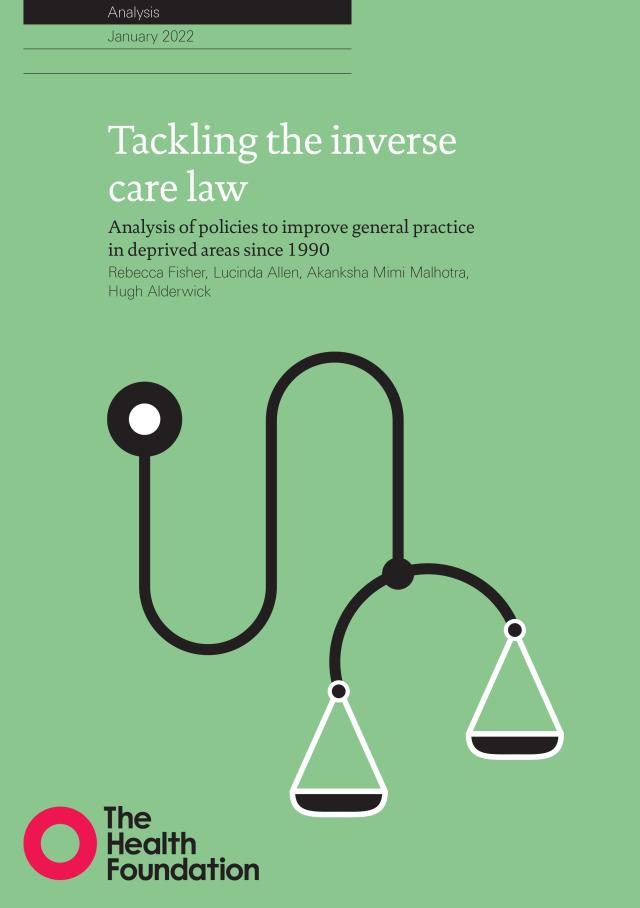Tackling the inverse care law Analysis of policies to improve general practice in deprived areas since 1990
January 2022

Key points
-
The ‘inverse care law’ was first defined by the GP Julian Tudor Hart 50 years ago, to describe how – perversely – people who most need health care are least likely to receive it.
-
GP practices in more deprived areas of England are relatively underfunded, under-doctored, and perform less well on a range of quality indicators compared with practices in wealthier areas.
-
Past governments have used a mix of approaches to try to make the provision of primary care in England fairer – including changes to GP funding, contracts, buildings, staffing, and other areas. In this report, we analyse national policies to reduce inequities in the supply of GP services in England since 1990, and evidence on their impact.
-
Policy development has not been linear. In the late 1990s and 2000s, Labour governments introduced several policies to try to improve general practice in deprived areas, as part of a wider strategy to reduce health inequalities. Evidence on their effect is limited, but these policies likely contributed to more equitable distribution of GPs. In contrast, efforts to tackle the inverse care law in general practice since 2010 have been more limited.
-
Overall, policy efforts to reduce inequities in the provision of GP services over the past 30 years have not been enough to overcome them.
-
General practice in England is under major strain. GP consultation numbers are now higher than before the pandemic but the number of permanent, fully qualified GPs has fallen since 2015. Current policies on general practice risk widening existing inequities.
-
National policymakers can do more to address these problems in general practice. An independent review of general practice funding allocations should be established and its recommendations implemented. Government should also consider stronger central coordination and oversight of GP distribution in England, as part of a new comprehensive workforce strategy for general practice.
-
Tackling the inverse care law in general practice aligns with the government’s ‘levelling up’ agenda, and must become a core objective of national policy.
This analysis reviews attempts to tackle inequities in the supply of general practice services in England over the past 30 years. The report looks at policies on general practice funding, workforce, premises, contracts and commissioning.
In the first part, we summarise the problem – describing recent evidence on differences in the provision of GP services between more and less deprived areas of England. In the second, we assess past attempts to address the problem – reviewing national policies to reduce inequities in the supply of general practice services in England. In the final part, we discuss the implications of our analysis and set out policy recommendations for addressing the inverse care law in general practice.
We provide several recommendations for national policymakers, including: a new equity test for all new policies in general practice; an independent review of general practice funding allocations; and a long-term workforce strategy for general practice that should consider stronger central coordination and oversight of GP distribution.
Cite this publication
Further reading
Further reading
Work with us
We look for talented and passionate individuals as everyone at the Health Foundation has an important role to play.
View current vacanciesThe Q community
Q is an initiative connecting people with improvement expertise across the UK.
Find out more


